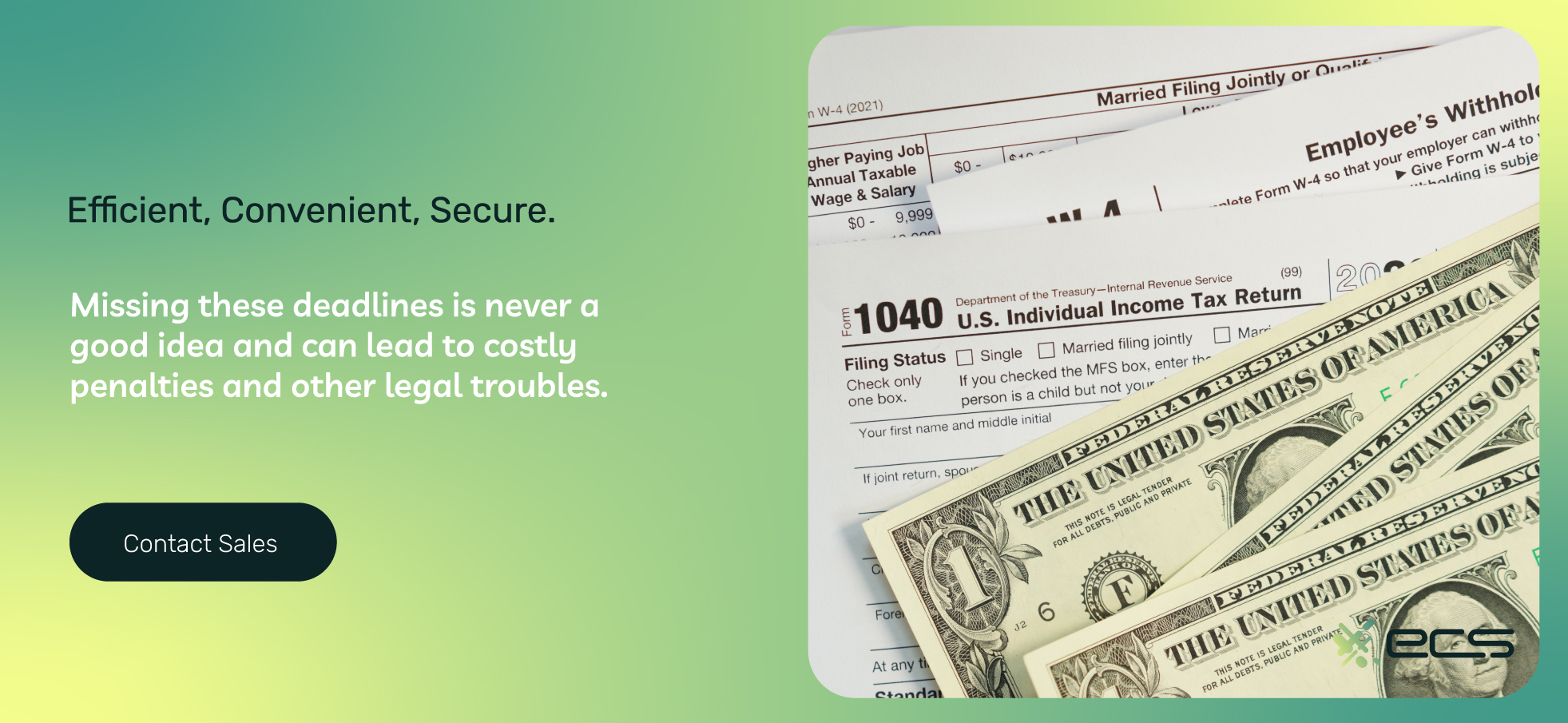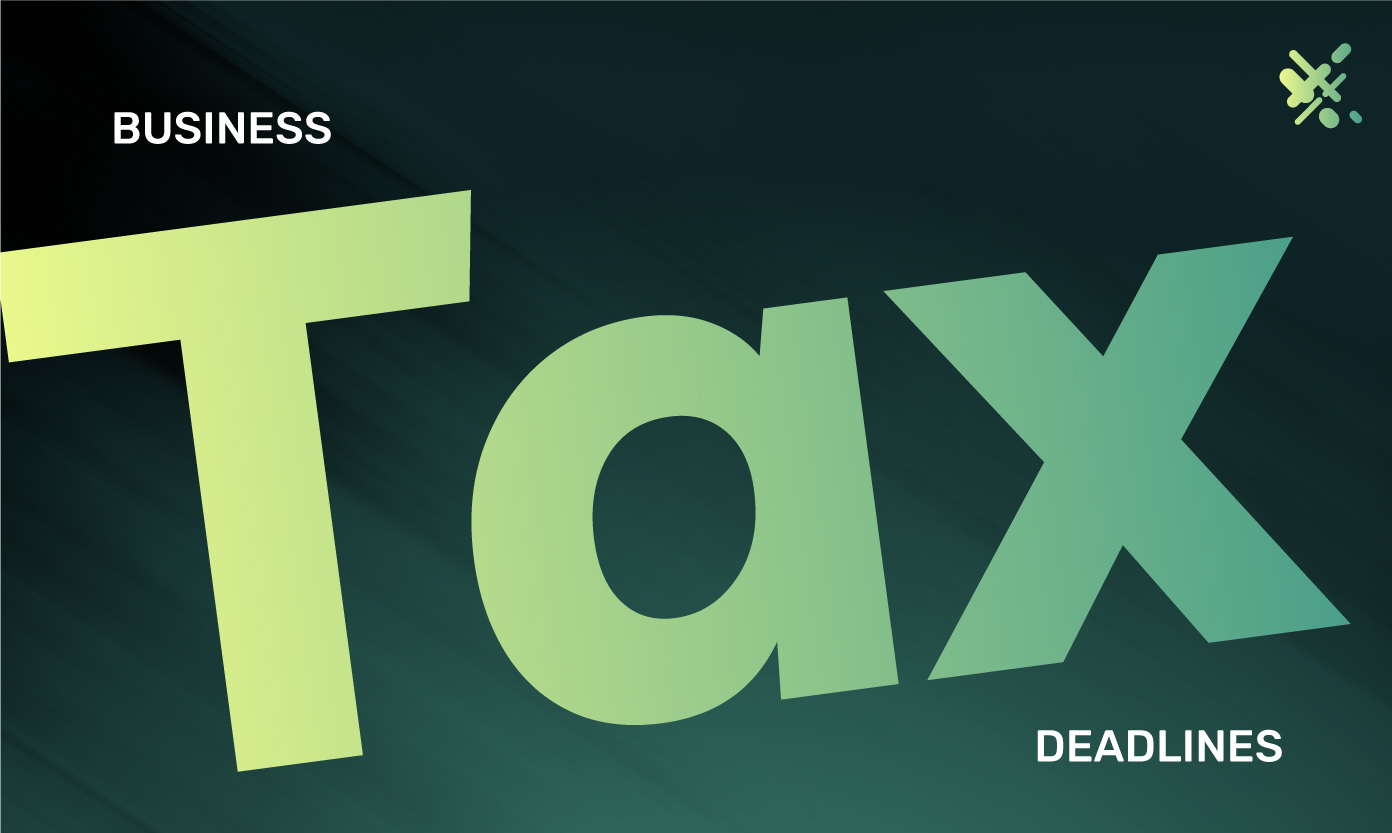As the 2024 tax season approaches, it’s important to understand all the business tax deadlines related to your business and tax filings.
The 2024 deadlines cover the 2023 tax year, and some dates have changed due to the day they fall on or because of IRS changes.
Missing these deadlines is never a good idea and can lead to costly penalties and other legal troubles. But if you can’t make a deadline, there are options to request extensions or seek other relief.
Below, we’ll go over all of the critical tax deadlines for 2024 so you can avoid any issues. We’ll also cover how you can request filing extensions and what the requirements are to do so.
When Will The IRS Start Accepting Filings
In 2024, the IRS will start accepting electronic filings At the end of January. While it’s common to wait until the last minute to file your taxes, this can cause issues, especially if your bookkeeping isn’t as structured as it should be.
Filing your taxes as early as possible can give your business some benefits, such as:
More Time To Pay
Waiting until the due date for filing your corporate tax returns or LLC taxes may result in a surprise tax bill you weren’t expecting. You may not have the funds for the payments, or making the payment could cause cash flow problems.
Filing as early as possible alerts you to what your tax payment is. You then have until the official tax deadline to pay. This gives you upwards of three months or so to budget for the payment.
Get A Refund Sooner
Although most businesses and LLCs don’t receive a tax refund, some do. If you have an LLC set up as a class C corporation, you can pay tax estimates quarterly. In some cases, you may be eligible for a refund under that system if your estimates were too high.
Filing early means you get your money back sooner, which is always nice.

Avoid Extensions
While tax extensions can be useful and help you avoid certain issues with filing late, they can still cause problems with your accounting.
Filing late and being unable to pay your tax bill means you still have to pay interest in most cases, even if you request an extension. This just adds to your tax bill, which is never what any business wants.
Using extensions strategically to handle specific situations can be useful. Using them as a last-minute lifesaver is generally not a good idea and can cost you more money in the long run.
What Is The Deadline For Sending Out 1099 Forms?
January 31, 2024, is the deadline for sending out 1099 forms. This includes the various 1099 IRS forms used when businesses pay non-employees or others directly from the business.
If you used freelancers or contractors, you likely have to issue them a 1099 for their services. If a weekend or holiday occurs on the due date, the IRS moves it to the next business day.
There are several types of 1099 forms small businesses may use, such as:
1099 INT
This is for interest paid to customers. If your business is a brokerage, bank, or other financial company, you may need to send out 1099 INT forms.
1099 NEC
This is probably the most common 1099 sent out by businesses, and it’s for non-employee compensation. Any payment to an independent contractor or freelancer worker totaling over $600 for the year will require a 1099 NEC.
1099 MISC
The 1099 NEC replaced this form for non-employee compensation. Now, any income or payment that doesn’t fall under the other forms utilizes the 1099 MISC.
Other 1099 forms include:
- 1099 K
- 1099 DIV
- 1099 G
- 1099 B
- 1099 R
- 1099 SA
- 1099 S
- 1099 PATR
All of these have the same due date of January 31.
Deadline for Estimated Quarterly Taxes
The deadlines for paying estimated quarterly federal income tax are as follows:
- First Quarter: April 15, 2024
- Second Quarter: June 17, 2024
- Third Quarter: September 16, 2024
- Fourth Quarter: January 15, 2025
One confusing aspect of this system is that the payments are not quarterly. As you can see from the dates, the first payment is 3.5 months into the year. But the second payment is over five months into the year, and the third is over eight months.
The quarterly estimated taxes serve as a means to divide your taxes into four equal payments, and they do not necessarily align with the traditional fiscal quarters.
What Businesses Need To Pay Estimated Quarterly Taxes?
Quarterly taxes for a business can be complicated, and it depends on the business structure and how the owner(s) take their income or salary.
For instance, when it comes to federal quarterly estimated taxes, a sole proprietor or a business owner operating through an LLC may need estimated quarterly taxes.
Whether you need to pay quarterly taxes can depend on whether your business is structured as either a C corporation or an LLC that is taxed like a C corporation.
Officers within the corporation may not have to pay quarterly taxes if they provide a service to the company. In this case, you would consider them employees and deduct taxes from their salary.
However, if officers of a company receive dividend payments or other compensation, then they may have to pay quarterly estimated taxes on those payments. The IRS will require business owners to pay estimated taxes if their total tax liability is likely to exceed $1,000 for the year.
The estimates will include two separate tax calculations. One is for income tax, and the other will be the self-employment tax amount to cover Social Security and Medicare taxes.


Corporation Tax Deadlines 2024
Corporations can have different tax deadlines depending on how they’re structured and whether they use a calendar year or a fiscal year. Class S corporations that use a calendar year will have their taxes due on March 15, 2024. Class C corporations using a calendar year will have their taxes due on April 15, 2024.
In the next sections, we’ll outline the tax deadline for LLCs as well as corporations that use a fiscal year instead of a calendar year.
LLC Tax Deadlines 2024: Partnerships, Multi-Member LLCs, and S Corporations
The following business structures will have their tax due date on March 15, 2024. If you have structured your business as the following, then this applies to you.
- Partnerships
- Multi-member LLCs
- S-corporations
If your business operates under one of these structures, then you will need to file your Form 1065 or 1120S by March 15. However, there are exceptions to this, and it depends on whether your business accounting follows a calendar year or a fiscal year format.
If your business uses a fiscal year for accounting, then the deadline is the 15th of the third month after the close of your tax year. For example, if your tax year ends on March 31, you would then have the tax deadline of June 15 instead of March 15.
For those following a calendar year, your tax deadline will always be the original date of March 15. If the 15th lands on a holiday or weekend, the deadline moves to the next regular business day after the 15th.
Sole Proprietor Tax Deadlines 2024
Sole proprietorships should submit a Schedule C along with their personal income tax return, which is due on April 15. Quarterly estimated taxes are due according to the schedule in the previous section for LLCs.
Taxes For Class C Corporations Are Due April 15, 2024
If your business is structured as a class C corporation, your tax deadline is the 15th day of April, which is generally considered tax day. For C-class corporations, you will be using Form 1120.
Similar to the other business structures already mentioned, there is a difference depending on whether your business follows a fiscal or calendar year schedule.
C-class corporations that use a calendar year use the April 15th tax deadline. For C-class corporations that use a fiscal, your tax deadline will be the 15th of the third month after your fiscal year ends.
The Due Date To Send Out W-2 Forms Is January 31
If your business needs to send out W-2 forms, the IRS sets the deadline of January 31. If the 31st falls on a weekend or holiday, then you use the earliest business day after that as the deadline.
As a business, you also have to file these W-2s with the Social Security Office by January 31.
The IRS has new regulations regarding W-2 forms, and businesses can submit these forms electronically now.
However, if you want to send these electronically instead of via the mail, you need to follow a few additional guidelines.
Consent
As an employer, you must receive consent from an employee before sending them an electronic W-2 instead of a mailed hard copy. If the employee ever retracts the consent, then you will have to revert to sending the W-2 via the mail.
Notifications
When using electronic W-2 forms, your business must also disclose various aspects of the form submission and consent procedure. This IRS document outlines these. The document describes how employees can deal with accessing the electronic forms, retracting consent, or changing their information.
When Is The Deadline For Filing a Business Tax Extension
If you have structured your business as a class S corporation, you must file an extension by the 15th of the third month after the ending date of your tax year.
For a class C corporation, the deadline is the 15th of the fourth month following the end of your calendar year. For businesses structured as partnerships, your deadline to file an extension will be the 15th of the third month following the end of your business calendar year.
If your business uses a fiscal year, then you adjust your due dates based on the ending of your fiscal year, but the same rules apply. Most businesses will use Form 7004 to file for an automatic extension. This is different from Form 4868, which is used for personal extensions, which would make the deadline for your personal taxes October 15, 2024.
It’s important to note that filing a tax extension for your business doesn’t mean you get an extension to pay any tax liability. When filing a tax extension, you will need to estimate your tax liability.
The extension is only for the formal filing documents, not the money owed in taxes. You should also be aware that underestimating your taxes can result in costly fees and penalties.
Finally, submit an extension to the state tax authority in the location of your business if necessary. In many states, your federal extension will cover a state extension.
However, you should check with your state to understand the extension procedure they have in place for businesses.

What Happens If I Miss a Tax Deadline
If you miss a tax deadline and owe taxes, the IRS will begin charging you interest on the amount owed. You will also incur failure to file penalties and failure to pay penalties on top of the interest.
These penalties and interest can add up very quickly, so it’s important to file as soon as possible if you do miss a deadline. You can file an extension if you know you will miss a deadline, and this will avoid any failure to file penalties. If you estimate your taxes properly and submit this amount, you can also avoid interest penalties.
Filing your taxes late and being owed a refund typically won’t result in any penalties. While it’s uncommon for a business to be eligible for a tax refund, it can happen in some cases.
You generally have three years from the original deadline to claim the owed refund.
What If I Can’t Pay My Total Tax Amount
If you can’t pay your total tax amount, you should still file a tax return. Most tax experts would suggest that you pay as much as you can afford along with your completed tax filing. After that, you can set up a payment plan with the IRS to cover the rest.
You will still incur interest and fees, but you will minimize them as much as possible compared to simply not paying at all or delaying the total payment.
If you can’t pay your taxes, you should consult a tax professional to determine the right course of action for your specific situation.
How Do I Change My Business Tax Return?
If you submitted a tax form for your corporation or LLC and noticed there was an error, you have options.
If you made a mistake in filing, you could amend your original tax filing. This encompasses specific instances, such as claiming a deduction for which you didn’t actually qualify.
However, for errors in math calculations, you do not need to amend your returns. The IRS will spot these and make the adjustments for you.
Also, if you forgot to include any necessary documentation, the IRS will contact you to obtain those documents. You do not need to amend your return unless the documents change something about your original filing.
Can Businesses File Taxes Electronically
Yes. Businesses can file electronically in many cases. This includes corporations, partnerships, and non-profit businesses.
Filing electronically is generally the fastest and easiest way to file taxes for a business. In some cases, filing electronically can also prevent errors, as the system checks the documents for certain omissions upon submission.
In general, you should take advantage of e-filling for your business if available.
Final Tax Deadline Tips For Corporations & LLCs
Tax time for businesses can be stressful, but if you plan ahead, it can make the process so much easier.
If you need to estimate your taxes quarterly, make sure to do so properly and try to be as accurate as possible. This helps to avoid surprises when you finally file your taxes at the end of the year.
Try to file as soon as possible or start to prepare your taxes as soon as possible. This also helps to avoid any undue stress and gives you the maximum time to pay any tax liability or set up a payment plan if needed.
If you’re starting a new business, deciding on the right structure for your business and how it will grow can have a big impact on your tax liability. Whether you choose an LLC, partnership, or corporation can mean different tax liabilities, deductions, and deadlines.
Make sure to do your proper research before deciding on a business structure to ensure you gain as much of a tax advantage as possible.
Finally, business taxes can be extremely complicated. If you don’t have accounting or tax experience, it’s always a good idea to hire a tax professional to help you with your tax filing.
The cost of hiring a professional is generally well worth the peace of mind of knowing that your taxes have been prepared properly and that you have taken advantage of every tax deduction you are legally allowed to.
—–
ECS Payments is a leader in providing the latest payment solutions for businesses that want to leverage the latest technology to drive sales and growth. Contact ECS Payments to learn more about the latest payment technology to help your business grow.
Frequently Asked Questions About Business Tax Deadlines
The IRS will begin accepting electronic filings at the end of January 2024 and continue until around April 15.
The tax deadlines vary based on a business’s structure. Partnerships, multi-member LLCs, and S-corporations share a deadline of March 15, 2024. Class C corporations and sole proprietorships have a deadline of April 15, 2024.
Benefits can benefit from filing early by having more time to gather the funds to pay taxes if you owe anything, receiving any potential refunds sooner, and avoiding extension-related issues.
Various forms, such as 1099 INT, 1099 NEC, and 1099 MISC, are required for businesses to submit, depending on the type of payment and business structure.
